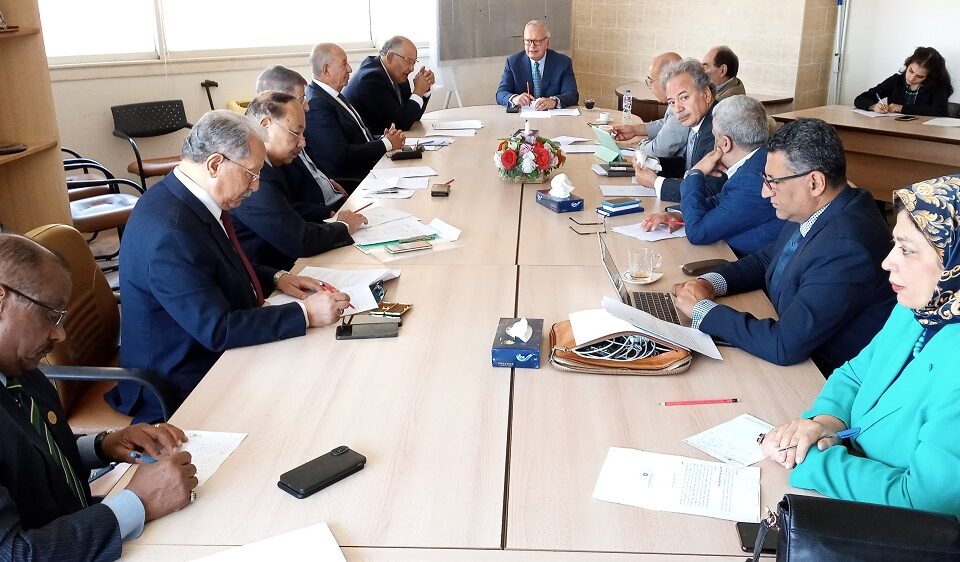Meeting with the Senegalese ambassador in Cairo
February 6, 2020Seminar on a new book by Mr. Atef Al-Ghamry
February 10, 2020
Within the framework of the Council’s interest in highlighting developments of the economic situation in the country, the council hosted a lecture by the economist Mr.Hany Tawfiq on February 9th, 2020, to talk about “economic reform in Egypt: achievements and challenges,” with the participation of Their Excellencies, Ambassadors: Dr. Mounir Zahran, Chairman of the Council; Dr. Ezzat Saad, its director; as well as Mohamed al-Naqli and Prince Abbas Helmy, Council members.
Regarding the reality of the economic situation on the ground, he stressed that there are positives associated with an increase in GDP growth rate that has risen from 2% in 2013 to 5.8% in 2019; restoring peace and internal stability that has been positively reflected by the rates of tourism as well as by direct and indirect investments; achieving political and economic balance and stability in Egypt’s foreign relations, which was based on the adoption of balanced regional policies by the Egyptian state with its partners, and not militarily interfering in any of the Middle East crises; a significant and noticeable improvement in the infrastructure sector coincided with the establishment of major national projects, such as developing the Suez Canal axis, road and bridge projects, as well as energy sector projects, along with major gas discoveries … etc; the balance of economic reforms and their synergy with a set of community reforms and humanitarian programs to achieve development in the sectors of health and education and to promote the poor and middle classes.
In terms of fiscal and monetary policies, although there has been an improvement in the indicators related to the period when the decision of floating the Egyptian pound was taken, improving foreign exchange reserves to around $45 billion instead of $16 billion in 2013, those steps have not continued.
As to the other aspect, namely, the challenges, there are many challenges that must be addressed which are divided into general ones related to the high rate of corruption that hits all sectors of the state despite the attempts of reform, and another related to the rise of population growth that reaches up to about 600 thousand new births every three months and this challenge has not been used as an opportunity to advance the country, in addition to the country’s entry into a process of extreme water poverty due to the increase in population growth rates and Egypt’s fixed water share since the 1950s at 55.5 billion cubic meters.
The second challenge concerns the state financial sector, noting that the reform process of any country should include financial, monetary and institutional reforms. Regarding the financial reforms undertaken by the Ministry of Finance, it confirms the lack of a clear governmental perception of the prioritization of expenditures and resources. The state also suffers from the acceleration of the growth of the state’s public debt, whether domestic or foreign (with a total of 6 trillion pounds as the value of foreign debt and about 11 million dollars as the value of domestic debt), which together represent more than 100% of the value of the country’s GDP of 6 trillion pounds in 2019. In addition to lacking the efficiency required for the tax collection process, as it does not exceed 15%, while it is assumed to be not less than a quarter or 25% of the GDP, as is the case for the rest of the world. As the government is required to collect taxes that amount to about 1500 billion pounds, but only 800 billion pounds are collected annually, and therefore there is a loss of 700 billion pounds. In fact, achieving efficiency in the collection process will in turn reduce the increase in budget deficit, in addition to the waste resulting from continuation of subsidies in kind, and the state crowding out the private sector, which has resulted in wasting state resources and weakening investments.
On the other hand, there is a defect related to the policies taken after the flotation process, because the price increase occurring after the floating currency is a natural reaction to this change. This should not have been met with the same mechanisms used to confront inflation (the continuous rise in the general level of prices), especially since what happened was a cost leap, and the rise in prices as a result of the increasing demand rates for commodities has not been the cause of the rise in price levels. Thus, the mechanism of increasing interest rates to overcome inflation by withdrawing market cash liquidity in order to achieve the decline in prices has not been achieved because this was not the appropriate mechanism, and all of that only led to the increase in prices as well as the entry of the economy into a cycle of depression, recession and a rise in unemployment rates. Despite the increase in foreign exchange reserves, this increase has been offset by a rise in debt to about 110 billion dollars and the absence of any clear mechanisms of resources to repay the debts, as most loans are paid through long-term resources and loans to pay short-term debts.
Finally, with regard to institutional reforms, there are still many sectors requiring major institutional reforms process, whether legal, judicial, or at the local government level. In addition to the high rates of corruption and the number of employees in the state governmental sector, that reached about 13 million employees, which means low efficiency in performance. The institutional sector also faces the lack of real consultations due to absence of any effective role played by the specialized national councils.






